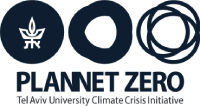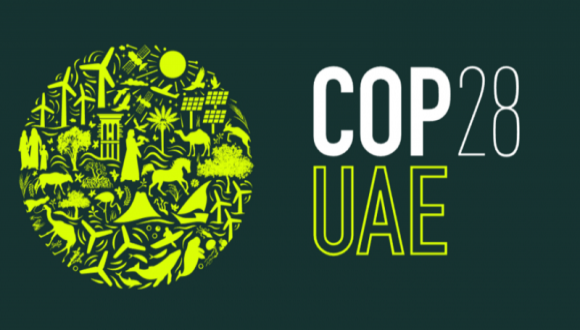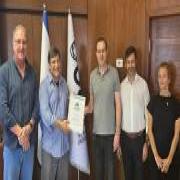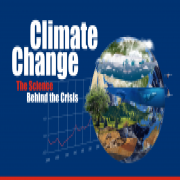What happened at COP 28?
Summary of our 'On Borrowed Time' townhall meeting on the outcomes of the UN Climate Conference in Dubai
At the conclusion of the UNFCCC COP-28 climate change conference in Dubai, the Climate Initiative held a public online meeting to discuss the outcomes in the conference. This was the second in a series, following an introductory session held to coincide with the opening of the COP28 conference.
Both meetings had an online audience of approximately 120 people who gathered to hear the insights of conference participants and local experts.
COP-28, this year's UNFCCC conference, was held in Dubai with a participation of approximately 85,000 people.
To see the official press release from the end of the conference, click here
The main achievements of the COP28 climate conference were as follows:
• Fundraising for the Loss & Damage Fund, the fund to compensate countries vulnerable to climate change
• An important agreement on the Global Stocktake (GST) "inventory count" for greenhouse gas emissions and review of progress on reducing emissions in light of the goals of the Paris Agreement. The same inventory calls on the countries of the world to take action by increasing three-fold the energy produced from renewable sources and doubling energy efficiency by 2030, in order to reduce the use of coal and inefficient fossil fuels.
• The parties also reached agreements on preparation for climate change - Global Goal on Adaptation (GGA) – based on the understanding that despite efforts to reduce emissions, the world is moving towards a state of warming and widespread consequences of climate change. Adaptation plans are needed, which will require financial support in more vulnerable countries, technological support and more.
• This year’s conference placed a significant emphasis on financial issues, including tools that will enable transitions from fossil fuels, and funds for transition and aid in developing countries such as The Green Climate Fund (GCF), Least Developed Countries Fund and more.
Dr. Dov Khenin, Chairman of the Israel Climate Forum, set up by the President of the State of Israel, opened the meeting by emphasizing the importance of the UN conferences. Although they do not have enforcement powers, they create a benchmark against which action can be taken. According to Dr. Khenin, one of the conference’s main achievements is the creation of an international dynamic leading to change. The current conference determined, for the first time, that the most significant way to solve the climate crisis is to move away from fossil fuels (until now no such statement had been made such). According to Dr. Khenin, the fact that such a complex meeting, in which representatives of fossil fuel companies actively participate, made this statement is already a significant achievement. However, as mentioned, this is only a benchmark and its implementation will be decided in the policy arena.
Various speakers presented their impressions of the conference and different critiques of its outcomes.
The first speaker, Ayelet Rosen, Head of the Environmental Conventions Division in Ministry of Environmental Protection, shared her impressions of the negotiations from her participation in the conference, including the achievements and disappointments.
Gideon Bachar, Israel's Climate Ambassador in the Ministry of Foreign Affairs joined the meeting online directly from the conference and presented the conference's significance for Israel - the need to raise Israel's emission reduction goals and related plans, while also accelerating adaptation processes to build resilience in the face of climate change. He also spoke about the importance of positioning Israel as a provider of innovative solutions and a leader in climate-related innovation including in agriculture, water and energy.
Bachar pointed out that the decisions taken at the conference will create long-term global process with an influence on international relations and the international economy. Decision-makers need solutions that will support the transition to renewable energies within a few years and increase energy efficiency. There are many opportunities and potential benefits for Israel if the country can position itself as a source of solutions, alongside regional collaborations.
Prof. Dan Rabinowitz, in his lecture entitled "Carbon subsidies - before the COP and after", focused on key statements made at the end of the conference such as "This is the beginning of the end” of fossil fuels and “Now all governments and businesses need to turn these pledges into real-economy outcomes”. He emphasized the importance of paying attention to what was said in these statements and above all, to what was not said.
Prof. Rabinowitz pointed out the focus on the coal industry, which is declining anyway, while fossil fuel companies that participated in the conference mainly sought to protect what he called the "holy grail" of the industry: subsidizing energy production from fossil fuels.
In her lecture “Water and Climate" Sharon Bengio of EcoPeace Middle East described the importance of continuing Israeli-Jordanian-Palestinian ties for regional cooperation and creating innovation opportunities, in light of the fact that we will all pay the price of climate change. Bengio emphasized that neighboring countries are already on the brink of feeling the effects of the climate crisis, which will have consequences for regional stability and water and energy security in Israel as well.
Gary Soleiman from Start-Up Nation Central spoke about "Israeli innovation at COP28". He mentioned the original plans for a huge Israeli delegation to the conference of 1000 participants from hundreds of different startups. Due to the security situation the delegation was very small in the end, with only about 20 start-up companies participating. Soleiman echoed the words of Gideon Bachar on the importance of Israel's positioning as a start-up nation including as a major contributor to climate change solutions.
Dr. David Lehrer from the Arava Institute for Environmental Studies spoke about the electricity grid in the context of renewable energy and cross-border solutions. He described the importance of investing in the electricity network to enable the provision of additional energy from renewable sources.
He also emphasized the situation in developing countries, where about 800 million people have no connection at all to an electricity grid. At the conference, discussions were held on future planning of solar and wind energy, including the capacity of the grid to receive the energy from these sources.
Steve Davison, Director of Strategy at "Cambridge Zero", joined the webinar to summarize his impressions of the COP, having just returned from Dubai, and talked about the place of academia at the UNFCCC conferences.
He emphasized the significant role of science-based decision-making for the COP conferences and the importance of the presence of university representatives.
He also noted the growing size of the conference, with about 85,000 people participating this year, over double the approximately 40,000 participants at COP26 in Glasgow in 2021, and a venue spread over 4 square kilometers. For those not directly familiar with the conference, this importantly shed light on the broad range of organizations and interested parties taking part, and also the multiple spaces and types of discussions taking place, from the formal negotiations and country representatives to areas occupied by civil society organizations.
In his lecture "What you see and what you hear - how to cover the COP", Tsur Mishal from Tel Aviv University closed the meeting with a fascinating presentation on how the media reviews the climate conference. He presented examples of how media channels on both sides of the political spectrum relate to (or deny) climate change issues, and concluded with a video drawing attention to false claims about the issue that are spread on the various news channels.
The COP29 conference will be held in Azerbaijan in 2024 and the subsequent conference, COP30, will be held in 2025 in Brazil.
Click here to watch the webinar recording (Hebrew)
If you haven’t joined TAU's Climate Initiative's mailing list to get the newsletter directly to your inbox, please join here.





